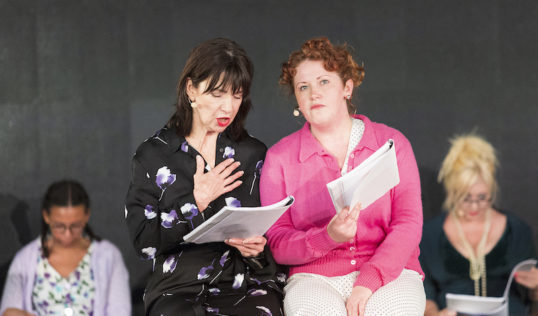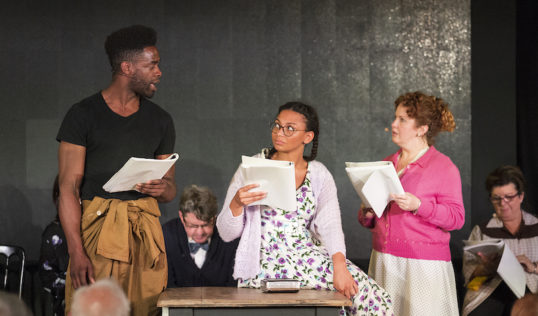A Spark of Philosophy
Muriel Spark at the Book Festival
by Hugh Simpson
This year’s Book Festival has featured several events designed to appeal to the theatre-goer which cross over with the strand celebrating the centenary of the birth of Edinburgh’s own Muriel Spark.
Doctors of Philosophy, Spark’s only original stage play, was a notable flop in 1962 and has hardly been seen since. Accordingly, the rehearsed reading staged in the Spiegeltent in partnership with the Royal Lyceum was keenly anticipated.
The first thing that has to be said is that the reasons for the play’s lack of success at the time are easy to understand. In a theatrical landscape dominated by Osborne and Wesker, its brittle archness must have been utterly unfashionable.
However, anyone reassured that a play set in the living room and terrace of a large London house, featuring a cast largely composed of well-to-do academics (the PhDs of the title), signalled a return to the world of Noel Coward and drawing-room comedy, would soon be dumbfounded. Instead, there is a swift turn into Pirandello territory in its absurdist meta-theatrical playfulness.
The play’s concentration on its female characters – the three males are so interchangeable they are even given the same name, Charlie – makes it considerably ahead of its time. Whether that time is now remains to be seen.
This reading (directed by Marilyn Imrie and in a version edited by Imrie and David Greig) was a resounding success on its own terms. Many of the things that made it so enjoyable might prove tricky to recreate in a fully staged version, however.
Imrie’s lightness of touch and the playfulness of the script suited such a semi-staged performance, while something of a dream cast – featuring Maureen Beattie, Sally Reid, Elaine C Smith, Hilary Lyon and Stuart McQuarrie, all on top of their form – would take some assembling for a longer period.
disparate individuals
What is most noticeable is the relative lack of interest Spark seems to have in developing her characters dramatically. Her noted prose gift for revealing people’s motivation, leads here to a group of disparate individuals with no real interest in communicating with each other. Aside from one notable exchange with Beattie and Reid sparking off each other, the rest of the time the characters appear to take very little notice of what the others are saying.
With characters speculating on whether married women can continue to work, or if academics should be celibate, much of this could come from the 1860s rather than the 1960s. A modern audience might need some adjusting to the atmosphere.
A fully staged production would certainly make sense with performers of the calibre mentioned above. Hetty Baynes Russell and Okorie Chukwu were also extremely funny and the other performers – Lois Chimimba and Buchan Lennon – provided strong support.
Radio Spark
A different take on dramatic versions of Bruntsfield’s finest came in the two Radio Spark events. Gaynor Macfarlane, producer and director of a recent series of plays on Radio 4 to coincide with the centenary, chaired two events dealing with how The Driver’s Seat and Memento Mori were adapted and dramatised.
While there may have been too much of a concentration on internal BBC policy for some, there were plenty of interesting insights into the process of creating a medium that most of the audience will have been very familiar with – while knowing little about the nuts and bolts of production.
There was also surprisingly little overlap of information across two markedly different events. Beatrice Colin, adapter of The Driver’s Seat, while highly informative and always interesting, was relatively diffident and reserved in an event largely driven by Macfarlane.
Memento‘s adapter Robin Brooks was far more expansive, driving the whole event, stressing the advantages and Macfarlane sometimes reduced to answering questions about supposed disagreements she could hardly remember but which Brooks recalled perfectly. Brooks obviously has a love-hate relationship with radio drama, a medium he described as endlessly flexible but also characterised more than once as ‘like shouting into a hole’.
In each case, a pair of first-rate actors provided illustrations of the respective plays – Shauna MacDonald and Robin Laing for The Driver’s Seat and Alexandra Mathie and Crawford Logan for Memento Mori. This element of the presentations seemed somewhat underused, particularly in the latter.
the unexpected
As is so often the case at the Book Festival, the most interesting part of these events was when the unexpected occurred, as a result of unexpected audience questions or peculiar assertions from the speakers.
Macfarlane’s statement that Spark has ‘fallen out of favour’ would have come as something of a shock to anyone who has been in Edinburgh in the last year, and particularly at a festival with so many events devoted to her.
Similarly, there was a repeated stress that any kind of performance has far more impact than the printed word on the page. This may well be a belief that many hold but it is odd to hear it said so often at a book festival.
It is also an odd sensibility that will readily describe scenes of rape and murder but balks at spelling out a fairly everyday swear word. Perhaps that is one of the signs you have been at Radio 4 too long.
The Book Festival continues until Monday 27 August.
Website: https://www.edbookfest.co.uk
ENDS




















